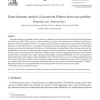Free Online Productivity Tools
i2Speak
i2Symbol
i2OCR
iTex2Img
iWeb2Print
iWeb2Shot
i2Type
iPdf2Split
iPdf2Merge
i2Bopomofo
i2Arabic
i2Style
i2Image
i2PDF
iLatex2Rtf
Sci2ools
COR
2006
2006
Game-theoretic analysis of an ancient Chinese horse race problem
This paper analyzes a legendary Chinese horse race problem involving the King of Qi and General Tianji which took place more than 2000 years ago. In this problem each player owns three horses of different speed classes and must choose the sequence of horses to compete against each other. Depending on the payoffs received by the players as a result of the horse races, we analyze two groups of constant-sum games. In each group, we consider three separate cases where the outcomes of the races are (i) deterministic, (ii) probabilistic within the same class, and (iii) probabilistic across classes. In the first group, the player who wins the majority of races receives a one-unit payoff. For this group we show analytically that the three different games with non-singular payoff matrices have the same solution where each player has a unique optimal mixed strategy with equal probabilities. For the second group of games where the payoff to a player is the total number of races his horses have w...
COR 2006 | Horse Race Problem | Horse Races | Horses |
| Added | 11 Dec 2010 |
| Updated | 11 Dec 2010 |
| Type | Journal |
| Year | 2006 |
| Where | COR |
| Authors | Mingming Leng, Mahmut Parlar |
Comments (0)

